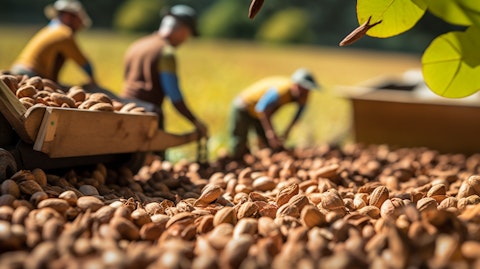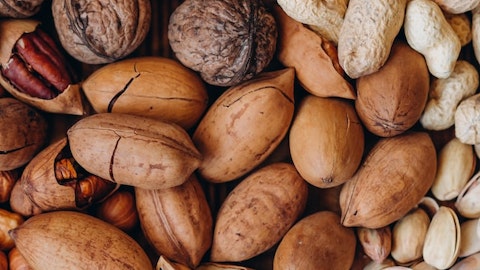John B. Sanfilippo & Son, Inc. (NASDAQ:JBSS) Q1 2024 Earnings Call Transcript November 1, 2023
Operator: Good day and thank you for standing by. Welcome to the John B. Sanfilippo & Son, Inc. First Quarter Fiscal 2024 Operating Results Conference Call. At this time, all participants are in a listen-only mode. After the speakers’ presentation, there will be a question-and-answer session. [Operator Instructions] Please be advised that today’s conference is being recorded. And I would now like to hand the conference over to your speaker today, the CEO, Jeffrey Sanfilippo. Sir, please go ahead.
Jeffrey Sanfilippo: Thank you, Chris. Good morning, everyone, and welcome to our 2024 first quarter earnings conference call. Thank you for joining us. On the call with me today is Frank Pellegrino, our CFO; and Jasper Sanfilippo, our COO. We may make some forward-looking statements today. Statements are based on our current expectations and they involve certain risks and uncertainties. The factors that could negatively impact results are explained in the various SEC filings that we have made, including Forms 10-K and 10-Q. We encourage you to refer to the filings to learn more about these risks and uncertainties that are inherent in our business. Starting with overall corporate performance. We delivered a 12.7% increase in diluted earnings per share for our fiscal 2024 first quarter, as the execution of our plan to control costs and invest in growth initiatives was accompanied by a challenging nut category and softness in consumer confidence, which resulted in a decrease in our sales volume.
We made a significant investment – marketing investment to relaunch the Orchard Valley Harvest brand in the first quarter, which resulted in a 3.2% year-over-year sales volume increase for our reimagined Orchard Valley Harvest product line. Although, we are in a difficult brand environment in the snack category, our marketing and sales teams are working hard to gain new distribution and differentiate our brand through innovative products and customer programs and creative social media campaigns. We will continue to strategically invest in growth opportunities as we monitor changes in consumer purchasing preferences. With the inflationary environment, we are seeing signs of consumers shifting to more value-focused retailers such as mass merchandising retailers, club stores and dollar stores, not all of which we currently distribute or sell to, but our teams are working hard to expand our retail distribution especially in the club channel with innovative products and pack sizes, and we continue to respond to the challenging and dynamic operating environment that we face today including the effects of inflation as we approach the holiday season and throughout the balance of this fiscal year.
In addition, the company continues to maintain a focus on manufacturing efficiencies, optimizing our supply chain and aligning our costs with selling prices. As we enter this year’s nut and dried food harvest season, we anticipate stable acquisition costs for most ingredients and tree nuts including almonds, cashews, pecans, pistachios and macadamias. We expect acquisition costs for peanuts to increase in the 2023 crop year as the market continues to strengthen as a result of continued export demand, poor crop in Argentina and concerns of the quality of the new crop. And peanut butter usage also remains very strong. In the current first quarter, we continued to invest in our people, production, capabilities and brands to lay the foundation for future growth.
Our long-range plan focuses on growing our non-branded business across key customers, transforming Fisher, Orchard Valley Harvest and Squirrel into leading brands while increasing distribution and diversifying our product portfolio to high-growth snacking segments. While we face headwinds in this economic time, we are executing our long-range plan by providing our non-branded customers with value-added solutions based on our extensive industry and consumer expertise. Our expansion into the energy and snack bar business and recent acquisition is a great example of how we are executing our long-range growth plans to become a $2 billion company. We will grow our branded business by reaching new consumers via product and packaging innovation, expanding distribution across current and alternative channels, diversifying our product offerings and focusing on new ways to reach consumers and engage them to buy our products.
In previous calls, I’ve talked about the Just the Cheese brand, which we acquired in December of last year. It is another example of how we are expanding our product portfolio to provide more value to our retail customers and consumers. While it is a small brand, we have grown distribution at a major grocery retailer and expanded in e-commerce. In the past quarter, we experienced double-digit growth with the brand. The product line also provides opportunities to get our sales teams in front of new buyers with a differentiated product and the acquisition expanded our production capabilities, we can add cheese crisps to our savory mixes and solid topping offerings. Success requires smart strategies and the right business model for sustainable growth.
It also requires a talented and committed group of leaders across the organization. We have all these elements of success at JBSS. I would like to thank all our team members who have worked tirelessly through this challenging times to maintain our exceptional service levels and quality. I’m optimistic our strategic investments and initiatives over the past three years will continue to drive strong operating results and create long-term stockholder value. I’m proud of every person in our company whose leadership and commitment to our customers and consumers is unwavering. I will now turn the call over to Frank Pellegrino to provide additional information on our financial performance for our first fiscal quarter. Frank?
Frank Pellegrino: Thanks, Jeffrey. As a reminder, we completed our Snack Bar acquisition at the beginning of the second quarter. Therefore, first quarter results were not materially impacted by the acquisition. Starting with the income statement. Net sales for the first quarter of fiscal 2024 decreased 7.3%, $234.1 million compared to net sales of $252.6 million for the first quarter of fiscal 2023. The decrease in net sales was mainly due to a 7.3% decrease in sales volume, which is defined as pounds sold to customers. Sales volume decreased 5.8% in the consumer distribution channel due to a 5% decrease in sales volume for private brand sales, driven primarily by fewer promotional programs and lower seasonal sales volume for snack and trail mixes as well as a decrease in peanut sales volume at two current mass merchandising retailers.
A 17% sales volume decrease for our branded products which includes Fisher recipe nuts, Fisher snack nuts, Orchard Valley Harvest and Southern Style Nuts also contributed to the overall decrease in sales volume in the consumer distribution channel. Decline in branded sales volume was mainly attributable to a 30.9% decrease in sales volume for Fisher snack nuts due to increased competitive pricing pressures, discontinuance of a product line at a mass merchandising retailer and the timing of holiday sales orders for a customer in the non-food sector. Sales volume for Fisher recipe decreased 10.8% due to a one-time order at an existing grocery customer in the same quarter of our prior fiscal year that did not reoccur in the current quarter and timing of holiday sales orders for another grocery customer.
Sales volume for Southern Style Nuts decreased 36.6%, mainly from reduced distribution and promotional programs at a club store customer. Sales volume decreased 5.5% in the commercial ingredients channel due to a 50.3% decrease in sales volume of peanut crushing stock to peanut oil produced processors, which was due to reduced peanut shelling in the current fiscal quarter. Sales volume decreased 19.4% in the contract packaging distribution channel, primarily due to decreased peanut distribution and the timing of holiday sales orders for a major customer. Gross profit increased $6.4 million or 12.6% to $57 million and gross profit margin as a percentage of net sales increased to 24.4% in the first quarter of fiscal 2024 from 20% in the first quarter of fiscal 2023.
The increase in gross profit margin was primarily due to lower commodity acquisition costs for all major tree nuts, which was partially offset by higher acquisition costs for peanuts, manufacturing efficiencies and decreased peanut sales volume. The increase in gross profit margin was also driven by lower acquisition costs for all major tree nuts and partially offset by decreased sales volume. Total operating expenses for the current first quarter increased $4.2 million in the quarterly comparison due to an increase in advertising expenses and charitable food donations, which was partially offset by a decrease in freight and incentive compensation expenses. Total operating expenses for the current first quarter increased to 13.9% of net sales from 11.2% from last year’s first quarter due to the reasons I cited before and a lower net sales base.

Interest expense for the current first quarter decreased to $200,000 from $700,000 for the first quarter of fiscal 2023 due to lower average debt levels. Net income for the first quarter of fiscal 2024 was $17.6 million or $1.51 per diluted share compared to $15.5 million or $1.34 per diluted share for the first quarter of fiscal 2023. Now I’ll take a look at inventory. Total value of inventories on hand at the end of the current first quarter decreased $17.3 million or 9% for a total value at the end of the first quarter of fiscal 2023. Decrease in the value of total inventories was primarily due to the early shell out of inshell pecans, lower acquisition costs for all major tree nuts and lower quantities of finished goods and work in process on hand.
This decrease was partially offset by higher quantities of pecans on hand. The weighted average cost per pound of raw nut and dried fruit input stock on hand decreased 2.6% year-over-year, mainly due to lower acquisition costs for all major tree nuts, which was partially offset by higher on-hand quantities of pecans. Please refer to our 10-Q, which will be filed tomorrow for additional details regarding financial performance for the first quarter of fiscal 2024. After the end of the quarter, on September 29, we completed the acquisition of the TreeHouse snack bar unit for approximately $61 million in cash, which was funded from our credit facility. We also increased the borrowing capacity of our credit facility to account for the short-term working capital requirements of this acquired snack bar business.
The acquisition included a manufacturing facility in Lakeville, Minnesota, inventory and customer relationships. Before I turn the call over to Jeffrey Sanfilippo, please note that we will be presenting at the Southwest IDEAS Conference in Dallas on November 15. Our presentation is scheduled to begin at 2:30 p.m. Central Standard Time. Now I will turn the call over to Jeffrey to discuss category trends.
Jeffrey Sanfilippo: Great. Thanks, Frank, for the financial updates. As Frank mentioned, we completed the acquisition of the snack bar business from TreeHouse Foods. This transaction significantly accelerates our product diversification strategy and we now have the capabilities to offer our private label retail partners a broader portfolio of snack bars. This new business complements our own internally developed nutrition bar program which had sales exceeding $1.5 million in the first quarter. I am so proud of the JBSS department leaders who are managing the integration of the TreeHouse bar business. They are working extremely hard and doing an extraordinary job. They have developed strong plans and a clear path to optimize the operation and create efficiencies to make this business accretive by the back half of fiscal 2025.
I had a chance to spend time with the Lakeville [ph] team joining our company. We are fortunate to have a strong group of dedicated people in the Minnesota facility, and we look forward to profitably growing the snack bar business together. Now I’ll turn to category updates for the quarter. As always, market information I’ll be referring to is Circana reported data, and today is for the period ending September 24, 2023. When I refer to Q1, I’m referring to 13 weeks of the quarter ending September 24, 2023. References to changes in volume or price are versus the corresponding period one year ago. We look at the category on Circana’s total U.S. definition, which includes food, drug, maps, Walmart, military and other outlets. Unless otherwise specified and when we discuss pricing, we are referring to average price per pound.
Breakouts of the recipe, snack and produce nut segments are based on our custom definitions developed in conjunction with Circana. The term velocity refers to the sales per point of distribution. In the latest quarter, we saw a significant shift in consumer behavior, not just in the nut and trail categories, but in the broader snack aisle. We are seeing volume declines across the entire snack aisle as consumers tighten their budgets in response to suddenly high food prices. COVID-era SNAP and student loan benefits ending and future economic uncertainty, the snack aisle declined 2.3% in volume and grew 3.3% in dollars in Q1. This is down from 1.7% volume decline and 11% dollar growth rate in fiscal 2023. The total nut and trail mix category was down 2% in dollars and down 3.4% in pound volume in Q1.
This is a decline versus what we saw last quarter. Overall, price increases across the category have moderated with price per pound up 1.4% in Q1 versus the prior year. While prices have stabilized the price per pound is still close to a five-year high. Now I will cover each segment in more depth, starting with Recipe Nuts. The Recipe Nut segment was down 3% in dollars and up 1% in pounds. This is consistent with the performance we saw in Q4 of 2023. Prices of recipe nuts were down 4.2% versus last year, driven by walnuts and pecans. Our Fisher brand had another successful quarter, growing 6% in dollars and 10% in pounds. Fisher’s performance resulted in growing dollar share by 1.3 points and remaining the brand [indiscernible]. Fisher’s performance was driven primarily by increased distribution and velocity in the mass channel.
Now let me turn to the Snack Nut segment. In Q1, the Snack Nut segment was down 3% in dollars and down 4% in pounds. This is slightly worse than the performance we saw in Q4 of 2023. Pricing continues to stabilize in the Snack Nut category with prices up just 1.2%. Fisher Snack performed worse in the category, down 21% in dollars and 25% in pounds. This was driven by a significant distribution loss in the mass channel, combined with velocity softness on peanuts in the grocery channel. We’ve lost distribution on Fisher snack small pack sizes as consumers are looking towards larger value packs. In response, we are focused on expanding distribution of our larger sizes and multipacks, but we continue to see strong results in the Oven Roasted Never Fried line.
The Trail and Snack Mix segment was up 1% in dollars and down 2% in pounds in Q1, slightly worse than the performance we saw in Q4 of 2023. Prices of trail mix were up 3.1%, slightly less than last quarter. Our Southern Style Nuts brand declined 14% in dollars and 21% in pounds. Declines were primarily driven by the club channel as competitive and pricing pressure has increased, resulting in loss distribution. The brand continues to grow in mass. Private brands continues to drive the trail mix category, up 1% in dollars in Q1. Our last segment, Produce Nuts, declined 3% in dollars and 5% in pound volume in Q1, slightly worse than the performance we saw in Q4 of 2023. Our Produce Nut brand, Orchard Valley Harvest, declined 28% in dollar sales and 25% in pounds, driven by distribution declines at a mass retailer and overall category softness.
We are seeing new product and packaging flow into the market and are focused on driving awareness and trial. In closing, looking ahead to the remainder of the fiscal year, our key priority is to successfully integrate our recently acquired snack bar manufacturing facility and business, optimize its operations. At the same time, it is critical that we continue to seek opportunities to profitably grow our branded and private label consumer nut business. No doubt, we are facing ongoing headwinds with shifts in consumer behavior, competitive pricing pressures and a declining nut category. Despite these headwinds, I’m confident we have the people, the processes, the brands, the expertise and the financial strength in place to be agile and successfully navigate our company through these volatile times to grow our business.
I would like to thank our amazing and hard-working team for their dedication and welcome our new Lakeville, Minnesota, employees to the family as we all work together to deliver long-term shareholder value. All of us have a steadfast commitment to develop business plans that create shareholder value and provide relevant, profitable, value-added products and services to our customers and consumers. We appreciate your participation in the call, and thank you for your interest in our company. We will now open the call to questions.
See also 17 Best Places to Retire in Europe for English Speakers and 30 Most Popular Wine Brands in America.
Q&A Session
Follow Sanfilippo John B & Son Inc (NASDAQ:JBSS)
Follow Sanfilippo John B & Son Inc (NASDAQ:JBSS)
Receive real-time insider trading and news alerts
Operator: Thank you. [Operator Instructions] Our first question will come from Nick Otton of CWB Wealth. Your line is open.
Nick Otton: Hi, guys. I just had a starting off question on the acquisition. So I was wondering once it’s fully integrated and I say perhaps in 2026, will it have the same kind of margin profile as the overall business?
Frank Pellegrino: Thanks, Nick, for your question. We’re still in the early process of integrating the business. But at this point, I would expect the operating margin to be consistent with our overall margin albeit our gross margin may be different.
Nick Otton: And then on this potential, like how much more revenue you think you can generate off this business from deepening the relationship with your largest suppliers, like Walmart and Target going forward?
Frank Pellegrino: I think we could grow this business by 20% to 30% over the next three or five years.
Nick Otton: And then following up, just one on the club channel, I was just wondering how big of a channel that is for you? And you’ve talked about growing more in there, so just what the opportunity looks like there?
Jeffrey Sanfilippo: Sure, Nick. So it’s really not a big channel for us today. It is a competitive channel. We have some distribution with Orchard Valley Harvest and a couple of divisions in there, in the channel, and then we have some of the Southern Style Nuts program at one of the major retailer, but it’s a huge opportunity. As we see consumers shifting to the club channel as a result of market situations of the economy, I just – it’s such an important channel that we need to participate and should be participating in. So we are really working hard to develop the right products, right value proposition for that channel to be successful, but it’s a small piece of our business today, but we’re focused on trying to build it.
Nick Otton: And then Hormel Foods had their Investor Day and one that stood out is they said for the Planters marketing they’ve changed it, and they’ve seen a 4x increase in the ROI for their marketing. So I was wondering, has there been any effect towards your business with potential shift changes or market share loss?
Jeffrey Sanfilippo: Sure. So Hormel has been extremely competitive with the Planters brand, actually for the – almost the entire past year, increased their marketing spend, they’ve been very creative. They’ve done a great job making brand awareness and their marketing programs are strong. So we have seen some impact, both on our branded product line, but also in the private label space. At some point, you’re seeing retail prices for Planters cheaper than the private label offering for a like item. So some consumers shift to their brand as a result of that competitive pricing points.
Nick Otton: Is that pricing sustainable for Planters or is this like a TreeHouse situation with the produce nut business?
Jeffrey Sanfilippo: Good question. Just to be tactful, I’m surprised they’re as competitive and investing so much this far along in the program. It’s very deep discounting.
Nick Otton: And then last one I had was just around – just all that buzz around Ozempic and other weight loss drugs. I’m wondering what you guys have thought about this and just how the relationship with the nut industry and just Ozempic and weight loss drugs do you think will evolve over time?
Jeffrey Sanfilippo: Yes. We haven’t seen an impact yet, and that’s – it’s time will tell. I think it’s going to be a while before we see any specific impact on the nut category. It’s just too early to see what kind of impact it may have at this point. Have you seen impact on other categories? Yes?
Nick Otton: Not so much. The one I’ve only seen for nuts is every nutritionist is really actually pounding the table for it because just protein to calorie consumption is so high. So I was just wondering if there’s maybe even a positive for you guys.
Jeffrey Sanfilippo: Well, hopefully, that’s the case. We’ll see.
Nick Otton: All right, thanks for taking my question.
Jeffrey Sanfilippo: Thanks Nick.
Operator: Thank you. [Operator Instructions] I’m not seeing any further questions in the queue. I would now like to turn the conference back to Jeffrey Sanfilippo for closing remarks.
Jeffrey Sanfilippo: Great. Thanks, Chris. Again, I want to thank everyone for your interest in JBSS. This concludes the call for our first quarter of fiscal 2024 operating results. Have a great day.
Operator: This does conclude today’s conference call. Thank you all for participating. You may now disconnect, and have a pleasant day.
Follow Sanfilippo John B & Son Inc (NASDAQ:JBSS)
Follow Sanfilippo John B & Son Inc (NASDAQ:JBSS)
Receive real-time insider trading and news alerts




